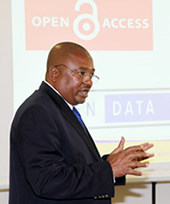
 The HIT community celebrated Open Access Week from 19 to 23 October, under the theme: "Open for Collaboration".
The HIT community celebrated Open Access Week from 19 to 23 October, under the theme: "Open for Collaboration".
The week –long celebrations were led by the HIT Library and were held as part of the 10th Anniversary celebrations.
Various activities made up the celebrations such as an Open Access seminar for the senior management team and a seminar for students, visits to schools, an outreach programme to students and other student -centred interactive activities.
The seminars, conducted by the HIT Librarian Mr. J. Maenzanise, examined Open Access as a model for scholarly communication dwelling on its origins, statements/declaration, and effects on the digital environment and diminishing library budgets.
 Mr. Maenzanise said that the main beneficiaries of the Open Access are researchers as it increases their ability to find and use relevant literatures, enhancing interdisciplinary research and accelerating the pace of research, discovery and innovation. Other beneficiaries include research funders, the public and students.
Mr. Maenzanise said that the main beneficiaries of the Open Access are researchers as it increases their ability to find and use relevant literatures, enhancing interdisciplinary research and accelerating the pace of research, discovery and innovation. Other beneficiaries include research funders, the public and students.
"Business and industry also stand to benefit from Open Access as it enables access to cutting-edge research, encourages innovation, stimulates new ideas, new services, new products; creating new opportunities for job creation and enabling vibrant research and development, backed by a strong knowledge and information base", said Mr. Maenzanise.
Open Access is so much in the interest of research funders and employers, that an increasing number of them around the world are introducing Open Access policies.
Open Access Week, a global event now entering its eighth year, is an opportunity for the academic and research community to continue to learn about the potential benefits of Open Access, to share what they've learned with colleagues, and to help inspire wider participation in helping to make Open Access a new norm in scholarship and research. "Open Access" to information – the free, immediate, online access to the results of scholarly research, and the right to use and re-use those results as you need – has the power to transform the way research and scientific inquiry are conducted. It has direct and widespread implications for academia, medicine, science, industry, and for society as a whole.